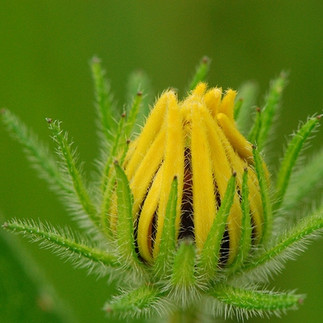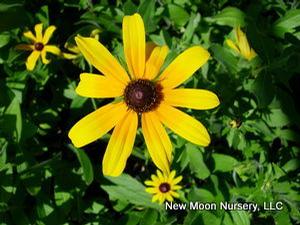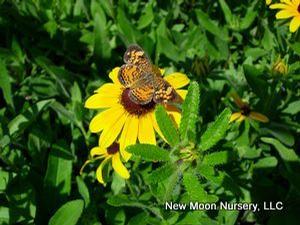Family: Asteraceae
Name: Rudbeckia hirta - Sweet Black-eyed Susan
Pictures: Top Row: Overwintered Foliage (Cyn Slaughter CC BY-NC-ND 4.0) , Foliage (Cathy Dewitt CC BY 4.0), Flower bud (Joshua Mayer CC-BY-SA 2.0) Bottom Row: Rudbeckia hirta (New Moon Nursery), Rudbeckia hirta with Pearl Crescent (New Moon Nursery), flower of the cultivar 'Marmalade' (KMS Native Plants)
Bloom Time: July - September
Flower: Golden Yellow
Soil Condition: Moist, Average, Dry, Well Drained
Light: Sun, Partial Shade
Height: 24-36" tall by 12-24" wide
Native Range: Eastern and Central North America including Long Island
Zone: 3 to 9
Rudbeckia hirta is a native biennial (life cycle of 2 years) or a short-lived perennial that self sows readily in the garden. It will do well where you plant it originally, but you will find plants in other places with the help of the birds. The flowers are 2-3" in diameter! It makes a fantastic fresh cut and dried flower.
Maintenance: Does best with some afternoon shade.
Benefits: clay soil tolerant, juglone (Black Walnut) tolerant, moderate drought tolerance, deer resistant, salt tolerant, Goldfinches eat the seeds, nectar source, pollinators, host plant to the Silvery Checkerspot
Cultivars: 'Marmalade', 'Indian Summer', 'Rustic Colours'
Companion Plants: Sorghastrum nutans - Indian Grass, Asclepias verticillata - Whorled Milkweed, Echinacea purpurea - Purple Coneflower, Tradescantia ohioensis - Ohio Spiderwort, Amorpha canescens - Leadplant, Monarda bradburiana - Eastern Bee Balm
=============================================================
References:












Comments